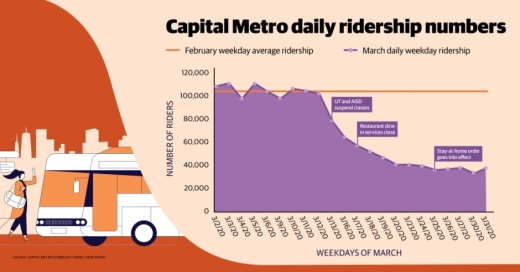Capital Metro’s daily ridership totals are down about 60% from the beginning of the month, a drop of tens of thousands of riders each day.
March passenger totals at Austin-Bergstrom International Airport will not be reported until May, but Bryce Dubee, a spokesperson for the airport, said totals are down by roughly 90%.
“It’s not unique to Austin. Realistically, the aviation industry globally has seen a significant decline,” Dubee said.
Loss of riders means loss of revenue. For the airport, according to Dubee, the drop in passengers will likely be reflected in both aeronautical revenue—funds from the trips themselves—as well as nonaeronautical revenue—money from services, such as parking or concessions.
Capital Metro, meanwhile, derives about 10% of its revenue from fares. A 60% drop through March would translate to about a 6% drop in revenue for the month. But the public transit agency is also bracing for a hit from a decline in its sales tax revenue, which accounts for the bulk of its budget, with fewer businesses open and fewer customers spending money in the area.
Capital Metro board Chair Wade Cooper said the exact figures for sales tax revenue decreases will be known at some point in the next couple of months.
“As we go further in the year and we see the declining revenue from sales tax, we’ll have to make that up from reserves in [the] short term and [from] Congress in [the] medium term,” Cooper said.
On April 2, U.S. Rep. Lloyd Doggett, D-Austin, announced in a media release that $104 million will be coming back to Austin as part of the federal CARES Act signed into law March 27.
That is part of an overall increase of $25 billion in federal grants to public transportation agencies in the CARES act, which also provides $10 billion to airports.
Cooper said it is not yet clear exactly how much Capital Metro will stand to gain from the act or exactly when the funding will arrive, and Dubee said staff at the airport need to go through an application process for grants, so the extent of help from Congress to Austin-Bergstrom is still unclear.
In addition to the transportation funding, the CARES act—CARES stands for Coronavirus Aid, Relief and Economic Security—provides Austin with $7.24 million in federal grants, which can be used for activities to prevent and respond to the coronavirus, such as public testing, meal delivery or training health care workers, according to a release from Sen. John Cornyn, R-TX.
The aid package of more than $2 trillion also increases unemployment insurance benefits by $600 per week and provides $100 billion in aid to hospitals, among other relief measures.





